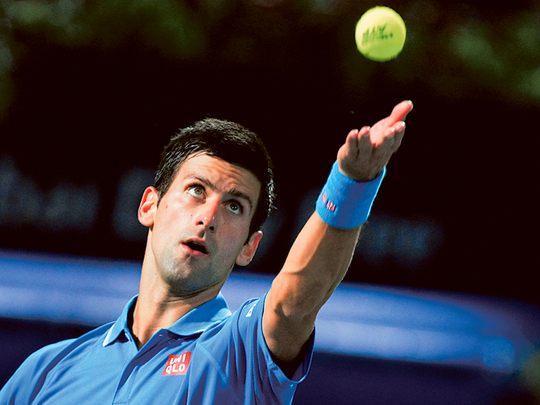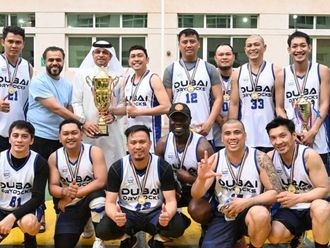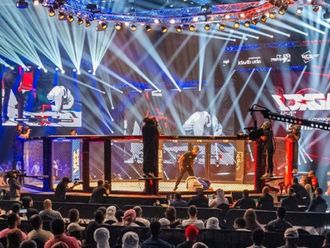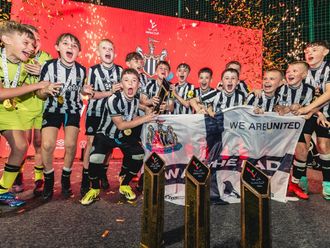
Dubai: Things are going exceptionally well in the world of Novak Djokovic and it’s not just because he is the undisputed No. 1 player in the world.
Djokovic is reaping the rewards of a run of dominance on the ATP Tour since he crashed onto the scene with the force of a meteorite in the late 2000s, forcing the likes of Roger Federer and Rafael Nadal to opt for serious introspection.
Djokovic has been relentless in his quest for success and acceptability from his peers. At the end of most matches they were forced to concede to his will to win as he imposed his dominance on the tour. Off the court, the world has slowly come to comprehend that the steel-reinforced mind of a merciless warrior houses the restless temperament of an intellectual.
Happily perched on top of the tennis tree, 49 singles titles — of which eight are vintage Grand Slam labels — later and with $75million (Dh275 million) stacked away in his bank account, Djokovic has rewired his priorities to help himself to some personal accomplishments. Recruiting Boris Becker as his head coach was a component of a bigger plan and the German legend isn’t just sitting in his Serbian manager’s office providing counsel on how to leverage the most out of fatherhood. This is just the cerebral fragment of their close relationship. Since Becker came on board Team Djokovic, the latter’s game went up a few notches with two grand slam titles to show for it.
Last year, Djokovic, 27, became a husband and a father, adding some substance into his humdrum life as a tennis professional and world traveller. Staying at home after a day’s battle on the courts has now assumed top priority and not without good reason either.
One by one, Djokovic seems to be ticking the boxes in his existential blueprint. His reverence of Serbian scientist Nicola Tesla is therefore no coincidence. Djokovic, or Nole, as he is referred to in his native Serbia and on the Tour, seems to have inherited DNA from Tesla — an electrical engineer, mechanical engineer and futurist. The pieces of his life are being engineered like the construction of a project that will span into his future when he retires from the game.
“Life has a way of arranging things,” Djokovic told Gulf News at the Dubai Duty Free Tennis Championships this week. “This is the way of life. We must prepare ourselves to the best of our abilities as we make way for a future we may not be a part of.
“When one era ends, another one begins. Sport is defined by its eras and by the players who stand out in their respective periods.
“You can already see a couple of players beginning to work their way up the pecking order and serve notice of their potential to the already established stars at the top. There’s [Milos] Raonic, [Kei] Nishikori, [Grigor] Dimitrov and [Marin] Cilic and they will be the future of tennis along with a few others. This is important for the game,” he reasoned.
This also explains why Djokovic is already starting to compartmentalise his life. He is beginning to prepare for the eventuality of retirement, though not just yet as there is still some road left to travel before the story ends.
“Tennis cannot be separated from my private life, where I have new roles as husband and father,” he stated. “My professional life and who I am reflects on my private life and vice versa. But it provides a fresh perspective and new meaning.
“I have come to value things outside of tennis and certain issues are more relevant to me now. I have been able to live my dream and play tennis, but I do not take anything for granted.
“I have come from a country which has lived through a war and I know what it feels like to have nothing in life. So I focus and value what I am good at so that it can help me attain things I strive for. This is why I am focused on the game and my family. It sustains me on multiple levels.”
His tennis may not have too many dimensions, other than the fact that his weaknesses are virtually impenetrable, but Djokovic’s mind has many facets — restless and craving wisdom. His interests, in science, classical music, religion and politics, are coupled to this constant thirst.
“I take things one step at a time,” he opined. “I believe that the sacrifices that you make help you to grow stronger.”
A step into the world of politics is ruled out for the future, even though he is Serbia’s most high-profile brand ambassador, because he feels it is too early for him to peer into that crystal ball and make a commitment.
“There is a time to experience the things and moments in your life,” he explained. “It is too early to be thinking about a life in politics. I am at a phase where I just want to be a tennis professional and a family man. My priorities need to be catalogued.”
There is, however, the overriding desire to ensure that his young son perceives him “as a good person, someone who helps others and uses his achievements to facilitate this.”
Djokovic will not hesitate to use tennis as a launch pad for fresh opportunities. As a spokesman for the game, given his status and his success, he feels that fellow professionals must exercise a collective accountability to bring themselves closer to each other.
Can colleagues be friends? “This is the best question that I have been asked in a long time,” he admitted. “I believe that we are going through a certain extreme nowadays. By that, I mean society as a whole and the media is always highlighting a competitive spirit in everything that we do or pursue. This, to an extent, is not genuine anymore and not in the spirit of the sport,” he said.
“Of course we all want to win and compete, but at the end of the day we are human and must strive to retain that human note. We must be aware that one day our careers are going to end — for some sooner than later — and then we need to be able to relate to our erstwhile colleagues.
“I feel that interpersonal connections between players on the tour must begin to establish themselves now. Sometimes it feels so rough and competitive on and off the courts. One finds it difficult to have a human relationship with colleagues. It is all about retaining that edge, which can be the vital component in our quest to win at all costs.”
Djokovic then delivers an appropriate recap of his new-found principles, and how they have been fashioned by the events in his life, saying, “We are human beings first and tennis players later.”












